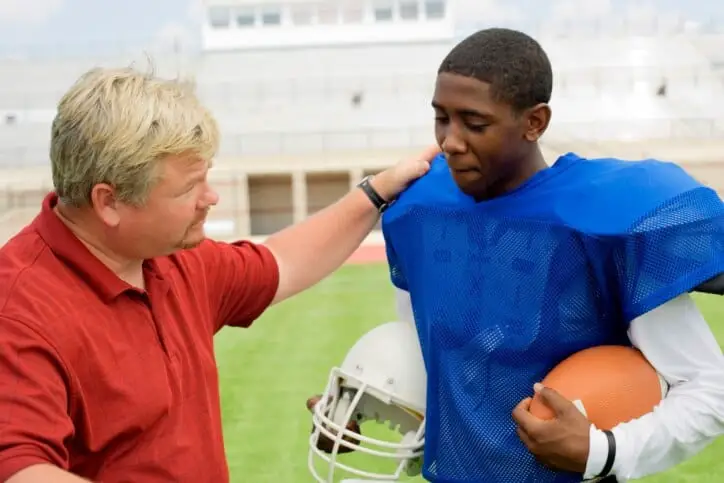Table of Contents
*This post may contain affiliate links. As an Amazon Associate we earn from qualifying purchases.

For coaches who want to inspire athletes to perform better, using motivational interviewing questions is a useful skill to develop. Motivational interviewing is an approach used in counseling settings to help people make progress on their goals. The technique is used when people feel ambivalent about change; they know they want to make changes but also have reasons for maybe keeping things the same.
Motivational interviewing is an influential approach to help athletes work through ambivalence about change by addressing mindset and connecting reasons to them personally. The other idea is to help athletes see, through questioning, why making changes are positive for them.
Below we have listed eight example questions that a coach can ask athletes to help lead an athlete towards an internal mindset change. Coaching an athlete to understand their WHY is a skill and the greatest coaches are masters at asking questions that point an athlete in the right direction.
This is an interesting video called Building Your Inner Coach that is packed with helpful language and techniques that explain why asking questions benefits performance:
1. What is your top goal this season?

If coaches don’t already know the athlete’s primary goal for the season, then this is one of the first questions they should ask. In order to successfully spark a deep personal motivation in someone, one must understand this goal and how come it is important to the athlete. If the athlete does not have a clear goal than a coach should guide the person into setting several realistic goals for themselves. As noted on Breaking Muscle, goals should be set by each player themselves because they are more likely to achieve the goals that way.
2. What are the gains of making changes and going after a particular goal?
Many people who try motivational interviewing questions or other forms of motivation instinctively want to jump into asking about why the individual wants to change. But it can be more helpful to steer the conversation toward understanding what benefits can occur with making changing and going after a particular goal. Help the person express why a goal is important and what positive emotions might be experienced when accomplished. This type of questioning can help build a better relationship between the coach and the athlete as the question is more about understanding the perspective of the athlete. After this a coach can determine how best to make the goal realistic and attainable, possibly even offering some modifications. The key is listening first.
3. What are the benefits of continuing what you’ve been doing or not making the change?
Another seemingly counter-intuitive question that coaches should ask players is “Are there benefits of continuing what you’ve been doing?” This question can help an athlete reflect and discover reasons that have been stopping them from making a change they want. With this acknowledgment and insight, they can brainstorm ideas for addressing those issues.
For example, a hockey athlete’s season has ended and she wants to be on the first line for her hockey team the next year. Typically, she has taken the summer months off from training. She and her coach discuss possibly training in summer. She feels ambivalent about making the change. Rather than convince her to train a coach can take more of a motivational interviewing approach and ask her what she sees as the benefits for her to taking the summer off? Or, what are the benefits of not making changes? The idea is for her to figure out how the change is positive rather than being simply told. And, possibly there is more to the story than the coach knows, like the need to help at her home. In the end, the aim is to build a relationship for the coach and athlete.

4. What are the benefits of making a change?
Asking athletes what they see as the benefits to making a particular change is another motivational interviewing question that coaches can ask. Motivational interviewing questions that spur a conversation about the benefits of change can help athletes find strong reasons to motivate themselves. It helps them follow through with the necessary steps in accomplishing their goals, too. After the coach knows these personal reasons why the player wants to improve, he can use it for motivation. Reminders like these are really helpful when progress might be hard to see or things start to get tough. This can be enough to spark their intrinsic motivation and push them through their own resistance to the change.
5. “If you had to (insert behavior here) for X amount of time to win a million dollars, could you do it?”
This is one of the motivational interviewing questions that researchers Linda and Mark Sobell found effective. “If you had to (insert behavior here) for X amount of time to win a million dollars, could you do it?” One can already see the power it has in encouraging positive change. Save the question for when a player doubts their ability to change. This simple question can help spark a mindset shift in players. They will realize that if they are willing and able to change for a reward, then they can indeed change.
6. What would your life look like five years from now if you did not change your behavior?
One way to open athletes’ eyes to the long-term consequences of their actions is to ask them this question. What would their life look like five years from now if they did not change certain behavior? Their minds will naturally start envisioning the future. And if they don’t like what they see, they’ll feel more motivated to change.
 7. Which skills would you work on to assist with changing?
7. Which skills would you work on to assist with changing?
Asking athletes this question helps them think about the “how” of change.
This question helps to connect goals with actions. It can help athletes reflect and gain greater clarity on what they need to do in order to accomplish their goal. The idea is to help the athlete have answers that come from themselves rather than the coach. Sometimes, answers that come from oneself are more influential than those that come from others.
8. What is one step you can take now?
A good way for coaches to wrap up their conversation with an athlete is to ask about what step can be taken now to get started. This refocuses the athlete and coach back to the present moment. It also decreases the overwhelming feeling that can come with change. The coach, in this way, can help the athlete figure out some concrete, smaller steps that can be taken in the present moment which increases the likelihood of taking action immediately. This is how change starts.
Basic Themes of Motivational Interviewing
Motivational interviewing questions can help spark personal motivation inside athletes. As long as the coach has good interpersonal skills, this strategy is often well-received by athletes. Motivational interviewing is about having a collaborative conversation process that makes the player feel more in control of their choices. Many people resist changing more when others tell them they need to change. Motivational interviewing can redirect this and help athletes be part of the solution to what changes to make, how best to make them and what steps to take to get started immediately.

